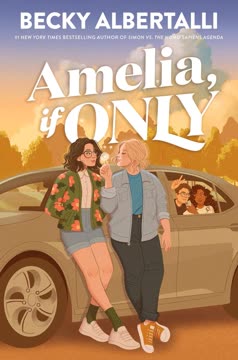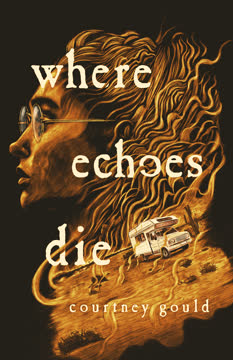Plot Summary
The Road to Aspera
Georgia Avis, sixteen, is driven by a desperate hunger to be seen, to be beautiful, and to belong somewhere better than her small, impoverished town. Her mother's death and her brother Tyler's struggles have left her adrift, but she clings to the memory of being noticed by Matthew Hayes, owner of the exclusive Aspera resort. When a modeling scam leaves her in debt and shame, Georgia's hope is rekindled by the idea of working at Aspera, the place her mother always said she didn't belong. Her journey toward the resort is both literal and symbolic—a quest for identity, validation, and a future she can claim as her own, even as the world seems determined to keep her out.
A Body in the Woods
On her way to Aspera, Georgia is struck by a car and, injured, stumbles upon the body of Ashley James, a local girl. The trauma of the discovery, the violence done to Ashley, and the loss of Georgia's own belongings—including the modeling photos—set off a chain of events that will haunt her. The brutality of Ashley's death, the evidence of sexual violence, and the sense of being watched or targeted leave Georgia shaken and vulnerable. This moment marks the beginning of her entanglement in a mystery and unreliable memory that is as much about the dangers facing girls as it is about her own need to be seen and valued.
The Most Beautiful Woman
After finding Ashley, Georgia is picked up by Cleo Hayes, Matthew's wife, whose beauty and poise are mesmerizing. Cleo's concern and attention are intoxicating for Georgia, who has rarely felt cared for or special. Cleo's presence at the scene, her gentle touch, and her invitation into Aspera's world are a revelation. For Georgia, Cleo becomes both a savior and an object of longing—a symbol of the life she wants and the kind of woman she might become. This encounter plants the seeds of a complex, fraught relationship that will shape Georgia's choices and sense of self.
Broken Promises, Broken Bones
Recovering from her injuries, Georgia faces her brother Tyler's anger and disappointment. The modeling scam has left them in financial trouble, and Tyler's protective love is mixed with frustration and fear. Their mother's legacy—her bitterness, her warnings about Aspera, her inability to dream—haunts Georgia, who feels both guilt and defiance. The tension between wanting more and being told she can't have it is embodied in her broken arm and the emotional wounds she carries. The family's struggles mirror the larger social divides of their town, and Georgia's longing for Aspera becomes a rebellion against her circumstances.
Nora's Grief, Georgia's Guilt
Nora James, Ashley's older sister, seeks out Georgia, demanding answers and understanding. Their interactions are fraught with pain, anger, and a shared sense of being outsiders. Nora's grief is raw, her determination to find Ashley's killer relentless. Georgia, wracked with guilt for not remembering more and for her own survival, is drawn into Nora's quest. Their relationship is complicated by class, history, and the possibility of something deeper—an intimacy that is both comforting and dangerous. Together, they navigate the aftermath of violence, the failures of adults, and the secrets that bind and separate them.
The Price of Beauty
The missing modeling photos become a symbol of Georgia's vulnerability and the dangers of being seen as beautiful. The scam that lured her, the man's predatory gaze, and the loss of the photos all point to the ways girls' bodies are commodified and endangered. Tyler's fear that the photos could be used against her, or that the man might return, heightens the sense of threat. Georgia's ambivalence about the photos—her pride in them, her shame, her sense of ownership—reflects the complex power and peril of beauty in a world that punishes girls for wanting and being wanted.
Aspera's Diamond Gates
Georgia's entry into Aspera is both a triumph and a disappointment. The resort's opulence, its exclusivity, and its rules about who belongs are intoxicating and intimidating. Matthew Hayes, charismatic and powerful, offers Georgia a job, but not the glamorous role she imagined. Instead, she is made an "Aspirant," a low-level position that keeps her on the margins. The encounter with Matthew and Cleo, the rituals of wealth, and the unspoken hierarchies of Aspera reveal both the allure and the emptiness of the world Georgia has longed to join. The promise of transformation is shadowed by the reality of exclusion.
Aspirant, Not Aspera Girl
Georgia's dream of becoming an Aspera girl—a role reserved for the most beautiful, poised, and privileged—collides with the reality of her mother's reputation and her own outsider status. The job she is given is menial, hidden, and unsatisfying. The sense of being judged, of never being enough, is reinforced by the attitudes of staff and members alike. Yet Georgia's determination only grows; she resolves to prove herself, to become indispensable, to force the world to recognize her worth. The gap between aspiration and reality becomes a crucible for her identity.
The Power of Wanting
As Georgia navigates Aspera, she encounters men who see her as an object of desire and power. Aidan Archer, a famous film producer, becomes both a symbol of opportunity and a predator. Their encounter—drinking, manipulation, and near-assault—exposes the dangers girls face in spaces controlled by men. Georgia's longing to be wanted, to be special, is weaponized against her. The aftermath leaves her shaken, ashamed, and more aware than ever of the costs of beauty and ambition. The incident also deepens her bond with Nora, who cares for her in her vulnerability.
The Modeling Scam
Georgia's search for her missing photos leads her to the house where they were taken, only to discover the modeling agency was a front for exploitation. The realization that she was one of many girls lured and photographed, that her images could be used for darker purposes, is devastating. The encounter with the woman who owns the house, and the police investigation, force Georgia to confront the ways girls are preyed upon and discarded. The photos, once a source of pride, become evidence of her exploitation—and a reminder of the world's indifference to girls' suffering.
The Ghosts of Ashley James
With Nora, Georgia investigates Ashley's disappearance, uncovering clues about her plans to escape, the people she trusted, and the adults who failed her. The discovery of a necklace, the testimony of Ashley's friend Liv, and the connections to Aspera and its staff reveal a web of secrets and betrayals. The girls' search is both an act of mourning and a quest for justice, but it is also a way of reclaiming agency in a world that has taken so much from them. The truth about Ashley's fate is elusive, but the process of seeking it binds Georgia and Nora together.
The Secret of the Necklace
The blue teardrop necklace, passed from Cleo to Ashley to Georgia, becomes a symbol of both protection and complicity. Its meaning shifts as Georgia learns more about its history—how it was meant to keep Ashley safe, how it marks girls as special, and how it is tied to the power dynamics of Aspera. The necklace is both a gift and a curse, a token of belonging and a reminder of the costs of survival. Its journey mirrors Georgia's own, as she moves from outsider to insider, from victim to participant in the resort's dark bargains.
The Truth About Justin
The investigation into Ashley's death leads to the shocking revelation that her father, Justin James, was her abuser and killer. The truth is almost too terrible to bear, and its exposure brings no real justice—only more pain, more loss, and more questions about how such evil could go unnoticed. Justin's suicide, the community's reaction, and the failures of the police and Aspera all point to the ways systems protect men and harm girls. For Georgia and Nora, the truth is both a relief and a new wound, forcing them to reckon with the limits of what can be known and healed.
The World That Hurts Girls
As Georgia is drawn deeper into Aspera's inner workings, she learns that the resort's power is built on the exploitation and silencing of girls. Cleo's mentorship, Matthew's attention, and the rituals of privilege all serve to maintain a world where men's desires are paramount and girls' suffering is collateral damage. The events of the summit, the fate of the Aspera girls, and the secrets kept by staff and members reveal a system designed to protect itself at any cost. Georgia's complicity—her willingness to do what is asked, to keep secrets, to accept gifts—becomes both a survival strategy and a source of shame.
Cleo's Lesson
Cleo, both victim and architect of Aspera's world, teaches Georgia the hard lessons of survival. She explains that the world is made by men, that beauty is a currency, and that power comes from knowing how to use what you have. Cleo's own history of abuse, her relationship with Matthew, and her role in the resort's secrets are both cautionary and aspirational. For Georgia, Cleo is a model of what it means to survive and thrive in a hostile world—but also a warning about the costs of complicity and the dangers of losing oneself in the pursuit of power.
The Cost of Survival
The final revelations—about Matthew's role in Ashley's death, Cleo's complicity, and the fate of the Aspera girls—force Georgia to confront the true cost of survival. The violence done to her, the bargains she has made, and the dreams she has chased all come at a price. The world she longed to join is revealed as corrupt and predatory, and the adults she trusted are exposed as abusers and enablers. Georgia's struggle to hold onto her sense of self, to protect Nora, and to find a way forward is both heartbreaking and defiant.
The Dream and the Lie
In the aftermath of trauma, Georgia must decide what kind of person she will be. The necklace, once a symbol of hope, is now a reminder of all she has lost and all she refuses to accept. The lessons of her mother, Tyler, Cleo, and Nora converge as Georgia realizes that the world's promises are lies, and that true power comes from refusing to be defined by others' desires. The act of taking off the necklace is both a rejection of complicity and an assertion of agency—a refusal to be the girl the world wants her to be.
Choosing Who You'll Be
The novel ends with Georgia and Nora together, holding each other in the darkness, refusing to accept the world as it is. Their love, their survival, and their refusal to be broken are acts of resistance. The story closes on a note of hard-won hope: that even in a world designed to hurt girls, they can choose who they will be, and that one day, the world might stop turning for those who do harm. The dream is not Aspera, or beauty, or belonging—but the freedom to define oneself, to love, and to survive.
Characters
Georgia Avis
Georgia is a sixteen-year-old girl marked by longing—for beauty, for belonging, for escape from poverty and grief. Her mother's death and her brother's struggles have left her isolated, but her desire to be seen and valued drives her into dangerous situations. Georgia's journey is one of self-discovery and survival, as she navigates exploitation, violence, and the seductive power of privilege. Her relationships—with Tyler, Nora, Cleo, and Matthew—reveal her complexity: she is both victim and agent, complicit and defiant, desperate for love but unwilling to be destroyed by the world's cruelty. Her arc is a testament to the resilience and vulnerability of girls in a world that punishes them for wanting.
Nora James
Nora is Ashley's older sister, a girl hardened by loss and betrayal. Her grief over Ashley's death is compounded by guilt, suspicion, and a relentless drive to find the truth. Nora's relationship with Georgia is fraught with tension, attraction, and the possibility of healing. She is both a protector and a survivor, navigating the failures of her family and the indifference of the world. Nora's strength is matched by her vulnerability, and her journey is one of learning to trust, to love, and to fight for herself and others. Her bond with Georgia becomes a source of hope and resistance.
Cleo Hayes
Cleo is the beautiful, poised wife of Matthew Hayes and a former outsider who has mastered the art of survival in a man's world. She is both mentor and manipulator, offering Georgia protection, guidance, and the promise of transformation. Cleo's own history of abuse and ambition shapes her worldview: she believes in using beauty and power to survive, even if it means complicity in harm. Her relationship with Georgia is intimate, seductive, and ultimately fraught with betrayal. Cleo embodies both the possibilities and the dangers of adapting to a corrupt system.
Matthew Hayes
Matthew is the owner of Aspera, a man whose charm and generosity mask a deep capacity for exploitation and self-interest. He is both a father figure and a predator, offering Georgia opportunities while using her for his own ends. Matthew's relationships—with Cleo, Georgia, and the staff—reveal the ways power is wielded and abused. His complicity in the resort's secrets, his role in Ashley's fate, and his manipulation of Georgia expose the rot at the heart of privilege. Matthew is both a symbol of what Georgia wants and what she must ultimately reject.
Tyler Avis
Tyler is Georgia's older brother, a working-class man struggling to care for his sister after their mother's death. His love is fierce but flawed, marked by frustration, exhaustion, and a sense of responsibility he cannot escape. Tyler's relationship with Georgia is strained by secrets, misunderstandings, and the weight of their shared past. He represents the limits of what family can offer in a world that is stacked against them, but also the possibility of unconditional love and forgiveness.
Ashley James
Ashley is the thirteen-year-old girl whose death sets the novel's events in motion. She is remembered as troubled, rebellious, and vulnerable—a girl who wanted more than the world would give her. Ashley's fate is a testament to the dangers girls face, the failures of adults, and the ways violence is hidden and excused. Her memory haunts Georgia and Nora, driving their search for truth and justice. Ashley is both a victim and a symbol of all the girls the world fails to protect.
Justin James
Justin is Ashley and Nora's father, a police officer whose authority and respectability mask his capacity for violence. His abuse of Ashley, his role in her death, and his eventual suicide reveal the depths of his depravity and the failures of the systems meant to protect girls. Justin's unraveling is both a personal tragedy and an indictment of the ways power shields men from accountability.
Kel Allred
Kel is Matthew's assistant and the manager of Aspera's executive floor. He is both a gatekeeper and an enabler, facilitating the resort's secrets and maintaining its veneer of respectability. Kel's relationship with Georgia is marked by mentorship, flirtation, and a shared understanding of the costs of survival. His involvement in Ashley's story, his loyalty to Matthew, and his own ambitions reveal the ways complicity is rewarded and the lines between victim and perpetrator are blurred.
Liv Adamson
Liv is Ashley's best friend, a girl marked by survivor's guilt and the burden of secrets. Her testimony about Ashley's last days, her own vulnerability, and her struggle to be heard reflect the ways girls are dismissed and blamed. Liv's grief and anger are both a warning and a call to action, reminding Georgia and Nora of the stakes of their search for truth.
Katy Avis (Georgia's mother)
Katy is a haunting presence in Georgia's life, her warnings and failures shaping her daughter's sense of self. Her inability to dream, her resentment of Aspera, and her complicated love for Georgia are both a source of pain and a lesson in survival. Katy's actions—her attempt to blackmail Aspera, her efforts to protect Georgia—are revealed to be both selfish and sacrificial. Her legacy is one of imperfect love and the hope that her daughter might find a better world.
Plot Devices
Duality of Beauty and Danger
The novel uses beauty as a double-edged sword: it is the source of Georgia's longing, her ticket to a better life, and the reason she is targeted and exploited. The modeling scam, the roles of Aspera girls, and the attention of men like Matthew and Aidan all illustrate how beauty is commodified and weaponized. The narrative structure juxtaposes moments of desire and validation with scenes of violence and betrayal, highlighting the perilous line girls walk in seeking to be seen.
Cyclical Trauma and Generational Patterns
The story is structured around cycles of trauma: mothers and daughters, victims and survivors, secrets and silences. Georgia's journey mirrors her mother's, Cleo's, and Ashley's, as each grapples with the limits of dreaming and the costs of survival. Foreshadowing is used to suggest the inevitability of harm, while moments of connection and resistance offer the possibility of change.
Mystery and Unreliable Memory
The plot unfolds as a mystery, with Georgia and Nora piecing together clues about Ashley's death, the modeling scam, and the secrets of Aspera. Georgia's memory is unreliable, shaped by trauma and denial, and the narrative uses gaps, flashbacks, and repetition to create suspense and ambiguity. The truth is always partial, contested, and painful, reflecting the difficulty of knowing and being known.
Symbolism of the Necklace
The blue teardrop necklace is a central symbol, representing both protection and the price of survival. Its passage from Cleo to Ashley to Georgia marks the transfer of power, knowledge, and responsibility. The act of taking off the necklace at the novel's end is a rejection of complicity and an assertion of agency.
Power Structures and Complicity
The narrative exposes the ways power is maintained through secrecy, loyalty, and the silencing of victims. Aspera, the police, and the community all participate in protecting men and harming girls. Georgia's journey from outsider to insider, her willingness to keep secrets, and her eventual refusal to accept the world as it is illustrate the costs and limits of complicity.
Intimacy and Solidarity
The relationship between Georgia and Nora is a counterpoint to the violence and betrayal that surround them. Their intimacy—emotional, physical, and sexual—is both a source of healing and a form of resistance. The novel uses their bond to suggest that solidarity among girls and women is possible, even in the face of overwhelming odds.
Analysis
Courtney Summers' I'm the Girl is a searing exploration of the dangers, desires, and double standards that shape girls' lives in a world built to hurt them. Through Georgia's journey—from longing outsider to complicit insider to survivor who reclaims her agency—the novel interrogates the seductive power of beauty, the costs of ambition, and the machinery of abuse that protects men and punishes girls. The narrative's structure—fragmented, cyclical, and emotionally raw—mirrors the experience of trauma and the difficulty of finding truth and justice. Summers refuses easy answers or redemptive arcs; instead, she offers a portrait of survival that is messy, compromised, and fiercely honest. The lessons of the book are hard-won: that the world is not fair, that power is rarely on the side of the vulnerable, and that dreaming is both necessary and dangerous. Yet, in the love between Georgia and Nora, and in the act of refusing to accept the world as it is, the novel finds a glimmer of hope—a belief that girls can choose who they will be, even when everything is stacked against them. I'm the Girl is a powerful indictment of complicity and a call to solidarity, urging readers to see, believe, and fight for the girls the world would rather forget.
Last updated:
Review Summary
I'm the Girl is a controversial and emotionally challenging novel that explores themes of power, privilege, and sexual exploitation. Many readers found it gripping and thought-provoking, praising Summers' writing style and unflinching approach to difficult subjects. However, some felt the plot was disjointed and the ending unsatisfying. The book's graphic content and heavy themes, including sexual assault and grooming, were triggering for some readers. Overall, opinions were divided, with some hailing it as an important work and others finding it too disturbing or poorly executed.
Similar Books
Download PDF
Download EPUB
.epub digital book format is ideal for reading ebooks on phones, tablets, and e-readers.









